Also available in: Español
Leire Ventas
BBC World
Latin America is the region in the world where hatred of Transgender people is shown in the most brutal way.
Globally, 78% of murders of members of this community take place there.
According to recent data from the Observatorio de Personas Trans Asesinadas, (Observatory of Murdered Trans People) dated March 30, this year, out of the 2.016 reported homicides between January 1, 2008 and December 31, 2015, 1573 happened there.
In Brazil, 802 were killed, in Mexico 229, in Colombia 105, in Venezuela 89 and in Honduras 79…No country is saved from the list of horrors.
And 65% of the victims, whose profession is known, were sex workers.
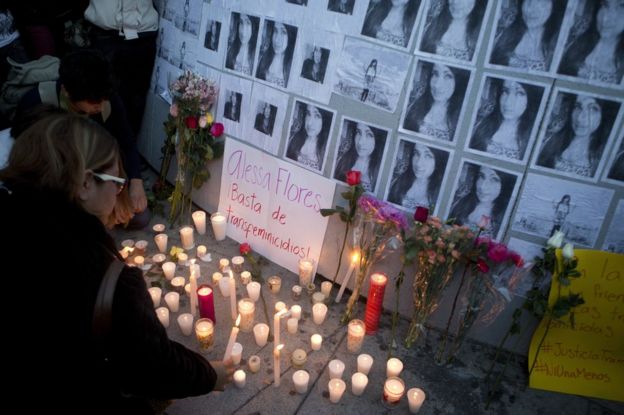 AP Alessa Flores, a transgender activist, was found dead on October 24 in a hotel of Mexico City.
AP Alessa Flores, a transgender activist, was found dead on October 24 in a hotel of Mexico City.
“Society stigmatizes us as sex figures and unfortunately, for many the only alternative is sex work and violence”, says Jimena Franco.
She fights everyday against stigma and her example breaks paradigms.
And she is not the only one.
Gislenne Zamayoa: “If we are present in TV shows and in the movies, I do not see why we could not be present in daily life”
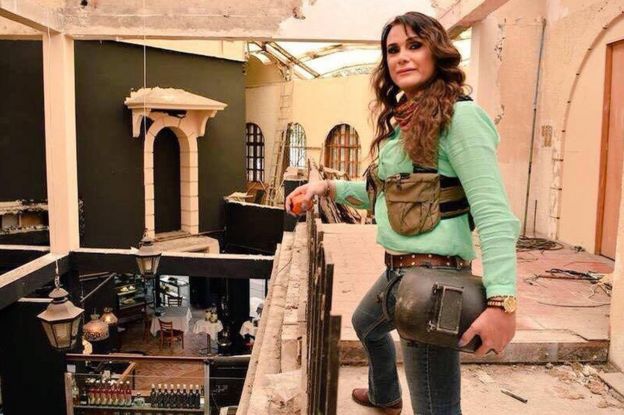 GISLENNE ZAMAYOA Mexican Gislenne Zamayoa founded her own architecture company, Arquia, as a transgender woman.
GISLENNE ZAMAYOA Mexican Gislenne Zamayoa founded her own architecture company, Arquia, as a transgender woman.
Gislenne Zamayoa is a 45 year old Mexican architect who always knew she was transgender.
She was four years old when she got all wet while playing and the maid did not have any clothes to change him, so she dressed him with his sister’s nightgown.
“I felt something totally different, I felt comfortable”, she remembers. “And then I realized I was not a boy. I was a girl”.
However, her transition did not begin until he was 36.
By then, she had already graduated as an architect with mention in urban management, and he would continue his education with Master Degrees on corporate design at the University of Los Andes, on industrial architecture at the University Bolivariana in Medellin, and on sustainable design at the Catholic University of Chile.
Then, during the time working at Coca Cola – first for the Andina Group and then for FEMSA Mexico -, she would take on his business trips a suitcase full of women’s clothes, makeup and high heels.
“When I finished my work, I would call a taxi from the hotel to take me to another hotel. There, I changed clothes, combed my hair and put on makeup and went out to the bars.”

GISLENNE ZAMAYOA Gislenne Zamayoa now leads and army of men in Arquia, her architecture office specialized in green design.
She was still working at Coca Cola when she decided to begin the “transition”.
When she announced that to the company, they offered her an administrative job, which she accepted at the beginning.
After some time, exhausted and after ending up in the hospital – “I had so much repression and I worked so hard that my body did not stand it anymore”- she decided to continue with architecture.
Already as a transgender woman, she was hired by Apple to build eight Mac Stores in Mexico. That allowed her to create her own company.
Now she is the leader of an army of men in Arquia, her architecture office specialized in green design.
If there were a Trans quota in the companies, I would fill that quota. We are trained, but there is no job, no offers”, she complains.
Therefore, to encourage labor inclusion of the community, she started cooperating with the Mexican Federation of LGBT Entrepreneurs (FME-LGBT) and signed an agreement with Nacional Financiera to get credits.
As a result, she has been able to boost the projects of 13 transgender entrepreneurs.
“If we are present in TV shows and in the movies, I do not see why we cannot be present in daily life”.
Lara Ramírez: “I do not feel trapped in the wrong body. Nature is diverse”.
 LARA RAMÍREZ In her Facebook profile, next to her name you can read in parenthesis: “The return of the warrior”.
LARA RAMÍREZ In her Facebook profile, next to her name you can read in parenthesis: “The return of the warrior”.
And it is so that Lara Ramírez, a 32 years old Uruguayan, had to struggle.
It was November 11, 2015. She tells us that she was getting off the bus coming back from work and some men coming out of a white car offered her to have sex with them.
“As I am a transgender person, many people think that I work in the sex market”, she tells BBC World.
When she refused they asked her name.
She replied with what her documents say since 2009, when in Uruguay they approved the law of the right to gender identity and the change of name and sex in identity documents.
But men yelled at her “Carlos, Pedro, Juan Saúl…” and they kept insulting her.
“They attacked me verbally all the time and when I asked them to escort me home because I had my ID there, they put handcuffs on me, they touched me and tried to put me in the car”
“It was then when they told me they were police officers, because until then I had thought it was a kidnapping. I am going to be one more raped and killed, she says she thought.
“I was going to be one more of the women killed in Uruguay in the last decade and whose cases were filed; for some judges Trans women are still men without rights”, she complains.
After going through court, her case was also filed.
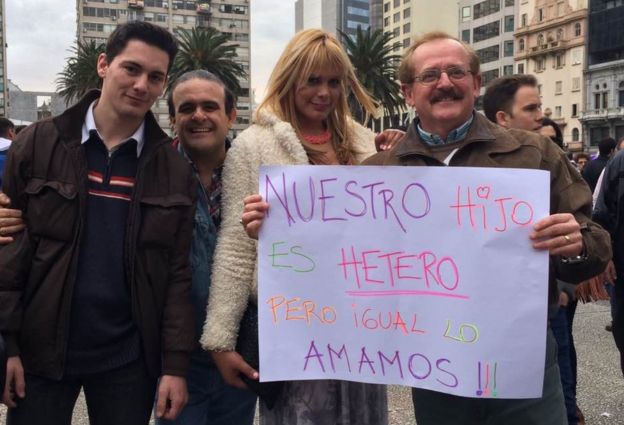 LARA RAMÍREZ Lara Ramírez at a protest in Montevideo, Uruguay.
LARA RAMÍREZ Lara Ramírez at a protest in Montevideo, Uruguay.
She also felt the stigma when she decided to start her physical change process and at the private health center they did not want to give her hormones.
“I ended up with self-medication with contraceptive pills that because they do not have that purpose, had terrible consequences”.
She says that at home everyone accepted her physical change. “But they were not going to accept that I would work in a corner”.
Given that prostitution was not an option for her either – “although the reality for almost all Trans women in Latin America is the street”- she clung to her job. And when some of her colleagues made a scandal because they did not want her to be like them, she joined the Union and stood in front of the management.
Today she states with satisfaction that thanks to her struggle, the company she works for, a supermarket chain is more inclusive.
When they ask her when she realized that she was a woman, she gets mad and claims it is a silly question.
“I do not feel I am a mistake from nature, I do not feel trapped in the wrong body. Nature is diverse”.
Tamara Adrian: “Machismo remains as a means of domination and the Trans community is not an exception”
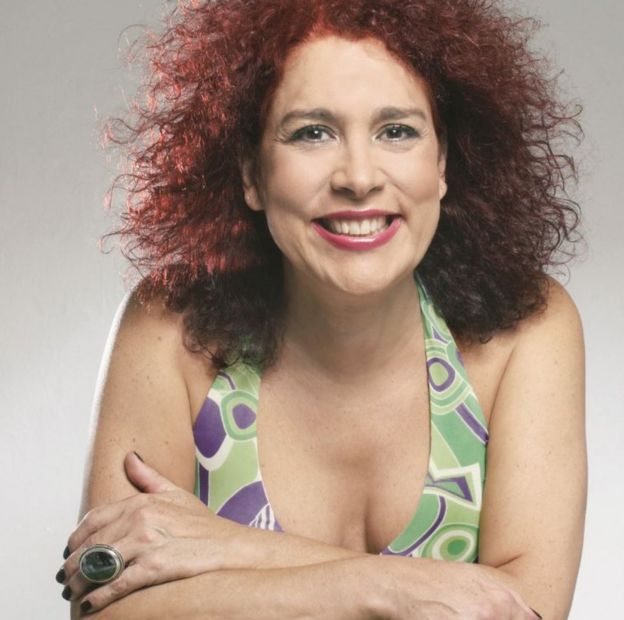 TAMARA ADRIÁN Tamara Adrián is a member of the National Assembly of Venezuela for the Democratic Union Movement since 2015.
TAMARA ADRIÁN Tamara Adrián is a member of the National Assembly of Venezuela for the Democratic Union Movement since 2015.
“The story of all Trans women is similar and mine is rather alike”, says Tamara Adrian, a 62 year old Venezuelan, not very willing to delve into the details.
“Like all of us, I had to face intolerance and exclusion due to that “cisnormative”concept with which the gender structure is intended to be made biological”, she says.
From her way of speaking you can tell that she is used to the political jargon.
It is that, precisely, what makes her story very different, although it has common elements with those of any transgender woman.
And it is that Adrian achieved a milestone: Since 2015 she has been a member of the National Assembly of Venezuela on the Democratic Unit Group (MUD), the coalition of the opposition parties.
With a degree from the Catholic University Andres Bello (UCAB) and a Doctorate in Commercial Law, from the University Panthéon-Assas of Paris, she also teaches Law at her Alma Mater the Central University of Venezuela (UCV) and at the Metropolitan University (Unimet).
She is aware of her privileged position, but remembers, just because we insist, that she also had parents that took her to the psychologist to “reorient”her.
She also remembers that in her adolescence she started taking hormones and left them as soon as the physical changes started, “due to the fear to miss options and that the only option would be prostitution”.
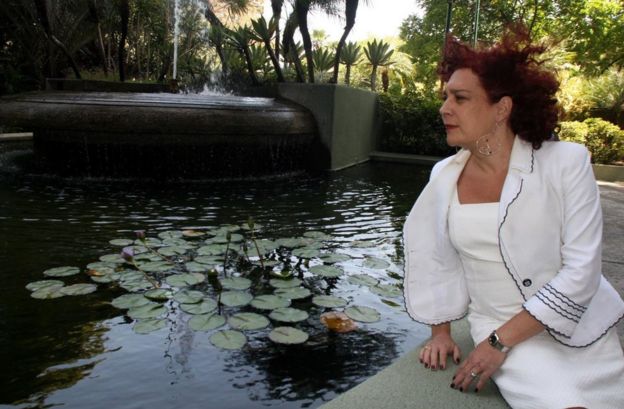 TAMARA ADRIÁN the Venezuelan claims herself feminist.
TAMARA ADRIÁN the Venezuelan claims herself feminist.
She admits that she felt her life was in danger. “Yes, It could have happened”, she says.
In 2002 she underwent a sex reassignment operation in Thailand, and back to Venezuela on May 14, 2004, she requested to the Constitutional Court of the Supreme Court the recognition of her identity, as legally she is still Tomas Adrian.
“Although the topic of the sex change operation is irrelevant for identity recognition”, she says.
So far she has not received a response. The highest court has not even made a statement on the admission of the dossier.
“Discrimination is terrible in Venezuela”, says Adrian, who also has some criticism for the community to which she belongs.
“Machismo remains as a means of domination and the Trans community is no exception. Many transgender women reproduce that system and they believe that the only mechanism for reinsertion is beauty”.
Hence, she claims feminist.
Ophelia Pastrana: “Which is the difference between us and somebody that had a gastric bypass and now nobody recognizes that person“?
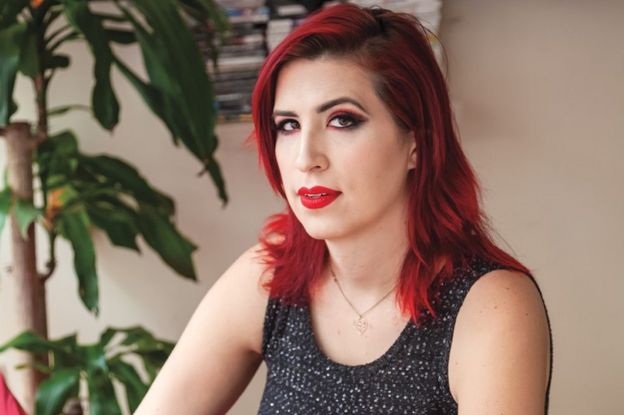 IVONNE VENEGAS Colombian Ophelia Pastrana moved to Mexico and founded Kraken Communication, a digital strategy company.
IVONNE VENEGAS Colombian Ophelia Pastrana moved to Mexico and founded Kraken Communication, a digital strategy company.
Which is the difference between our histories and those from a person that had a gastric bypass and went from 250 to 90 kilograms, and has a life where everything is accepted and happy, although nobody will recognize that person? Asks the 34 years old Colombian Ophelia Pastrana.
“That our case went through gender and that is taboo in society”, answers to herself.
She was born in a prominent family of Colombia – her father is cousin of former president Andres Pastrana and her maternal grandfather was Hisnardo Ardila, former mayor of Bogota – she says that until she turned 28 she did not know that she could change gender.
“I was never curious, but I did work out a lot because I was disgusted with my body”, she remembers.
This is how her life went: she studied physics at the University of los Andes and at the Florida Atlantic University, she has a master’s degree on econometrics at the University of Sidney, she created a computer and communication company, she got married.
In 2011 she moved to Mexico where she founded Kraken Communication, company aimed at creating digital strategies and smart phone applications.
“I was called from large companies and began to be successful, but also had lots of stress”.
“It was then where my fondness for women’s clothing started, I wore it at home, privately, as a way to escape, I thought.”
“One day, standing in front of a mirror I told myself: “you look like a man wearing a dress”. “No, better, you look like a woman complaining that you look like a man on a dress”, she says.
“It was a moment of epiphany”.
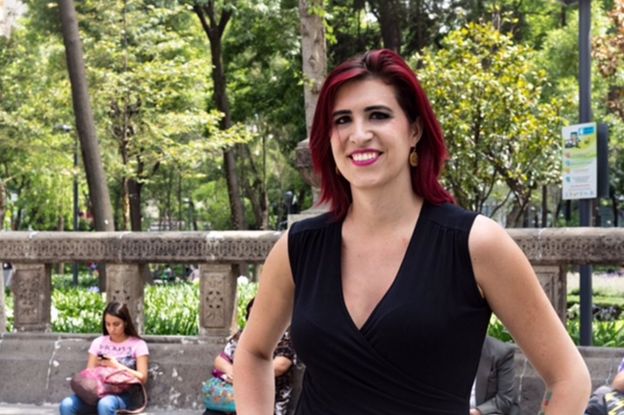 JORGE MUNGÍA “I speak from the privilege, because I come from a wealthy family and was able to study, but many other children are kicked out of their homes”recognizes Ophelia Pastrana.
JORGE MUNGÍA “I speak from the privilege, because I come from a wealthy family and was able to study, but many other children are kicked out of their homes”recognizes Ophelia Pastrana.
Then came the euphoria, the feeling that she had already solved the problem, opening the door to “feminine likings”.
“I went from being a migrant millionaire boy to a transvestite woman and entered an area of discrimination”.
Facing that, she says she developed a “filter for idiots”.
Although she says that when she goes back to Colombia, she stops being a woman, and she tells us an anecdote of when she went to renew her tax ID.
“The official looked at me weirdly, because my passport says Mauricio Pastrana. So I told him that at the beginning my parents thought I was a boy, but then the veterinarian confirmed I was not”, she laughs.
And she faces criticism with that kind of humor. “In addition, I speak from the privilege, because I come from a wealthy family and was able to study, but many other children are kicked out of their homes”.
She boasts of being the second transgender woman with more followers in social networks worldwide.
“I became my own product”, she says.
This year she has given more than 100 conferences.
It helps me to become visible and to make others visible as well”.
Jimena Franco: “We are a time bomb due to poor surgeries”
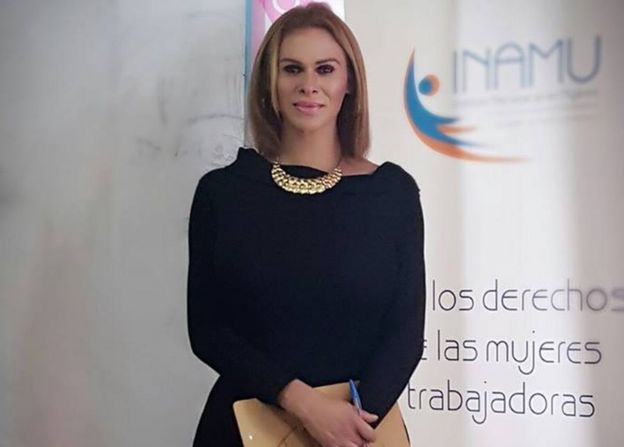 JIMENA FRANCO “Prostitution is the only thing left for a transgender woman to survive in Costa Rica”, says Jimena Franco, who with hard work was able to study and now is launching her first movie as a protagonist.
JIMENA FRANCO “Prostitution is the only thing left for a transgender woman to survive in Costa Rica”, says Jimena Franco, who with hard work was able to study and now is launching her first movie as a protagonist.
“They say transgender women are whores, that we steal, that we are alcoholics, but what we really want is to study and succeed”says Jimena Franco from Costa Rica.
“What we lack are opportunities”, she insists, as did the other women interviewed for this report. “Today, prostitution is the only thing left for a transgender woman to survive in Costa Rica”.
In addition, “we are a time bomb due to poor surgeries, to doctors that injected us vegetal oil telling us that later it would turn into body fat”, she says.
“In Costa Rica old trans women become men again, without access to hormones they dress like men, sick with HIV, worn out by drugs and abuse”, she regrets. “All their lives lost in a street.
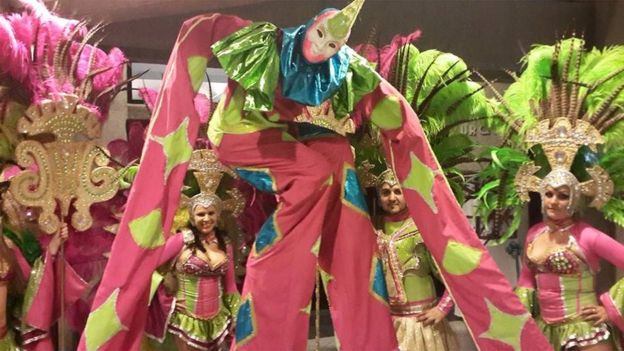 JIMENA FRANCO Jimena Franco says that although she founded the National “Comparsa” Latin Stars, many times she is limited to drive the bus.
JIMENA FRANCO Jimena Franco says that although she founded the National “Comparsa” Latin Stars, many times she is limited to drive the bus.
She was herself trapped without options for one year and a half in that profession that today she remembers as “dark and horrendous”.
Her very poor family kicked her out of home when they learnt that she was really a woman and not a gay adolescent.
Although afterwards her mother chose her before a “very conservative”husband and today she is her only family.
She comforts and supports her day to day, with the company that she founded when she was 16, “the National “Comparsa”Latin Stars, where she cannot dance.
“When we go to birthday parties, graduations and private events, the contracts usually state that transvestites, fat people or women with little clothing are not accepted”, she says.
“So, I refrain from dancing and become the bus driver”.
She is also trying to make her way as an actress, after having studied radio and television voice-over.
“I want to be an actress, not a Trans actress. Just Jimena Franco, actress.”
In December the movie “Hug me as before”will be released, where she is the protagonist, directed by the Costa Rican director Jurgen Urena.
Dania Gutierrez: “The onslaught of the traditionalist current in Mexico is so strong that it borders on hatred”
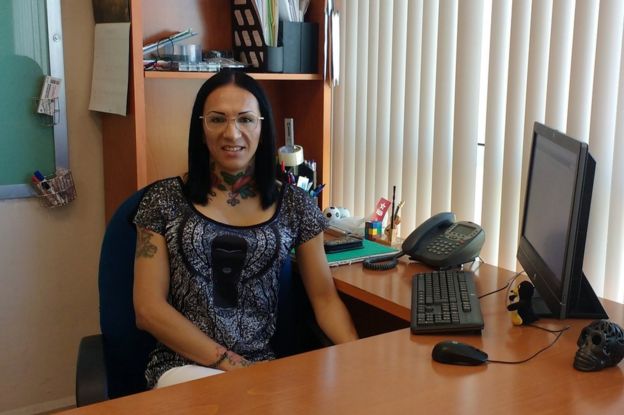 DANIA GUTIÉRREZ Mexican Dania Gutiérrez is a doctor on bioengineering and works as a researcher at the Research and Advanced Studies Center of the National Polytechnic Institute, at the Monterrey campus.
DANIA GUTIÉRREZ Mexican Dania Gutiérrez is a doctor on bioengineering and works as a researcher at the Research and Advanced Studies Center of the National Polytechnic Institute, at the Monterrey campus.
“It is not common at all to have a transgender woman on research, and I am aware that mine is an extraordinary case”, says Mexican Dania Gutierrez.
“But the institution where I work and my colleagues knew how to value my capacity”.
She is a doctor on bioengineering and works as principal researcher and academic secretary at the Research and Advanced Studies Center of the National Polytechnic Institute at the Monterrey, Nuevo Leon campus.
It was there where she completed the transformation process.
“I have childhood memories that show that I knew something was not alright with me, but it was very difficult to understand what was it”, she says.
“The turning point was meeting the US culture”, she states.
She attended the University of Illinois in Chicago, where she went in 1998 to get her master’s degree and doctorate later on.
“At 25 I met a more open culture, with means to understand what was happening to me, with a university with strong studies on gender, with a lot of information to read and full of people who had studied in other countries and had had contact with diversity”.
“I also had access to free therapeutic services”.
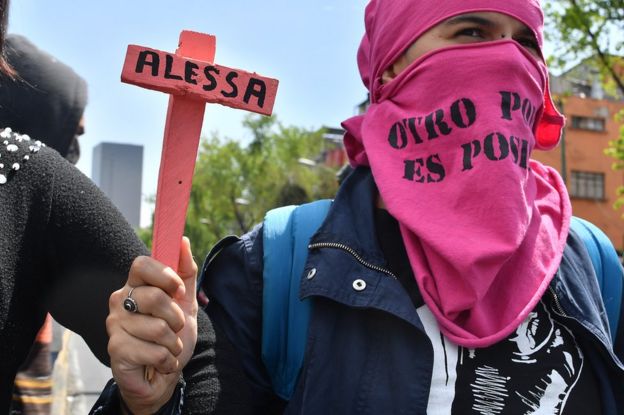 GETTY IMAGES Dana Gutierrez believes that the traditionalist culture in Mexico borders on hatred and that makes this a very difficult time for transgender people.
GETTY IMAGES Dana Gutierrez believes that the traditionalist culture in Mexico borders on hatred and that makes this a very difficult time for transgender people.
She started her transition process in 2000 and went back to Mexico “as an androgynous person”, with very advanced hormonal replacement.
“But I still did not live as a woman full time”, she explains.
She took that step in 2009.
And since then her family keeps her “banished”. She is only in touch with one sister.
“These are very hard times in Mexico because there is still a traditionalist current that refuses to die”, she says.
“And the onslaught is so strong that it borders on hatred”.
This note is part of the publication #100Women, winner of several international awards, where BBC gives every year since 2013, a broad space to women, preparing a list of 100 outstanding women all over the world on their achievements, struggles or extraordinary experiences.
